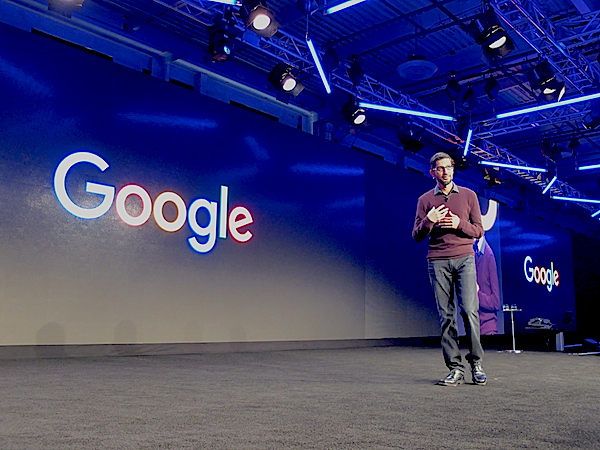
Google chief executive officer Sundar Pichai announces Google Cloud Platform’s new products at GCPNext 2016 in San Francisco. MARLET SALAZAR
Google’s announcement of partnerships with companies like Coca Cola, Spotify and Disney Interactive at the GCPNext 2016 held recently sends the message that it’s taking cloud computing and its enterprise business seriously.
While others see the announcement of Google Cloud Platform’s (GCP) new products and partnerships as “third-wheeling” with Amazon Web Services and Microsoft’s Azure, Google made it clear that enterprise companies would have the privilege of using the infrastructure that powered it.
“We are in the beginning of what’s possible with the cloud,” said Sundar Pichai, chief executive officer of Google. “It feels like the special time of the confluence of the right people, the right technology and the right time.”
Pichai added: “In the future, almost anything would be done on the cloud because it’s simply a better way to do computing.”
Google Cloud Platform is a suite of products and services that includes big data, computing, machine learning, networking, operations, storage and tools. Pichai said each of the products “have a billion users each.”
“To put the scale in perspective, in Gmail alone, we handle around 1.4 petabytes of information daily and that’s like 1,400 libraries of congress every single day,” said Pichai, 43, who took over the Google helm from Larry Page in August 2015. Page, Google cofounder, has since taken over chief executive duties for parent company Alphabet.
“For years, we’ve been investing in scaling up our infrastructure to do this,” he said. “Because the thing we care about as a business are the same things you care about as you’re building your businesses.”
“We are at a point where we are opening it (GCP) up so that every business can build what’s next,” he said. “We want this to work for all kinds of businesses.”
Data centers
Conversations on cloud have clearly made a big leap from storage to machine learning. Google’s innovations such as BigQuery promises to “process trillions of rows in seconds—building streaming data pipelines with Google Cloud Dataflow.” The announcement of new, as well as enhanced, products and services gave a preview of what’s next in cloud computing, which is giving enterprises first-hand control as well as “real” real-time data analytics.
In February this year, Spotify announced it was moving its core infrastructure to Google Cloud because of its track record in coming up with data-focused tools, which are useful to its kind of business.
“It’s quite hard to build data centers,” said Nicholas Harteau, vice president for infrastructure of the music streaming service. “We saw an opportunity to spend our focus elsewhere and that is the driver to (moving to) Google Cloud Platform.
“We can spend our time and energy turning data into value,” he added. “When you are talking about a technology like Big Query and Data Flow, you will feel the Spotify product evolve and make the user experience great.”
Google also announced its data center expansion. The first two of the 10 to open this year are located in Oregon, USA and Tokyo, Japan. Last year, it opened South Carolina for all major GCP services. Google said the data centers in the new regions “will help Cloud Platform customers deploy services and applications nearer to their own customers, for lower latency and greater responsiveness. With these new regions, even more applications become candidates to run on Cloud Platform, and get the benefits of Google-level scale and industry leading price/performance.”
“We’ve spent billions on data centers and are going to use them as much as we can,” said Diane Greene, senior vice president for Google’s cloud business and founder and former CEO of technology company VMWare. “This is a long-term, forever event.
Greene joined Google enterprise to head the cloud business late last year.
GCPNext 2016 played around the next wave of cloud computing, which is allowing enterprises—regardless of size—to maximize what technology could offer in building a wider customer base, having a stronger backend and more reliable data analysis and making use of machine learning all done on the same platform that technology giant Google uses. RC